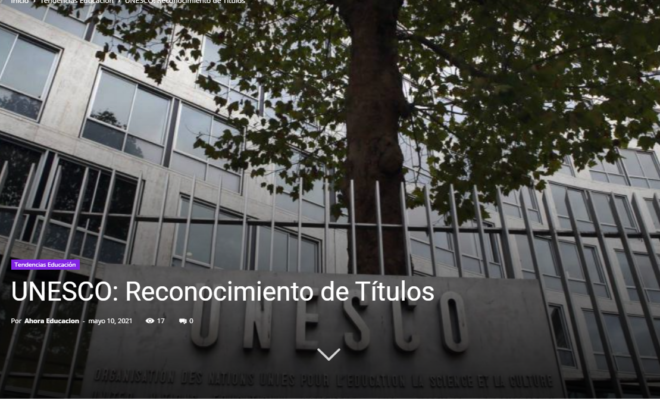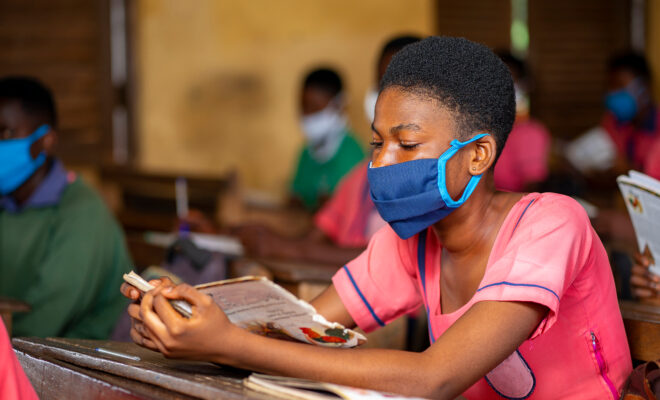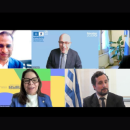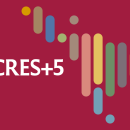After the World Higher Education Conference, what’s next on the global higher education agenda?

By Sebastián Mattos and Emma Sabzalieva
The third UNESCO World Higher Education Conference (WHEC) took place in May 2022 in Barcelona, Spain. With over 2,000 participants from 139 countries joining in person and over 8,000 online registrants, the conference was a major opportunity to engage a wide range of stakeholders in “reshaping ideas and practices in higher education to ensure sustainable development for the planet and humanity”. UNESCO IESALC played a leading role in the conference, facilitating and/or participating in 17 events, contributing to several background documents and officially launching four reports (1) during the event.
The broad reach of the conference facilitated discussion and debate on the many questions, challenges and opportunities that are critical to higher education around the world. Current global issues such as the Covid-19 pandemic cut through almost all the topics. Given the major impact that the pandemic continues to have on education, the direction of many of the conference sessions towards this area was much needed. The pandemic continues to mobilize global action as demonstrated by the forthcoming UN Transforming Education summit.
Beyond the cross-cutting topics that were raised at the WHEC, UNESCO IESALC undertook an analysis of the content of the conference sessions. The general trend across these recurring issues presented at the conference seem to be leading towards a focus on sustainability and inclusion by employing digital tools and innovative financial schemes.
Within this general trend, five main topics were uncovered. Each is crucial for higher education today and to the world that we are collectively shaping, raising issues and future challenges for advocacy, research and policy.
1. Equality and inclusion
This was by far the most recurrent topic of the sessions reviewed by UNESCO IESALC. It was directly discussed in sessions such as those dedicated to higher education as a human right, Indigenous perspectives in higher education and the inclusion of refugees. Issues relating to equity and inclusion were visible in other panels whether the focus was on the impact of COVID-19 or small island states.
A key message emerging from this topic is the promotion of equal access and opportunities to complete higher education for anyone who would like to study, regardless of their background
or access to prior opportunities. There was a call for actors in higher education to be supportive, respect cultural diversity and the ability to live together to work in a local and global community.
In this context, it is necessary for governments and higher education actors to assess whether their systems present difficulties for access to higher education, whether there are high discrimination incidence rates that need to be addressed, and whether sufficient resources are being allocated to promote inclusion.
2. Virtualization
Digitalization and the further embedding of technology as a tool to support higher education was taken up in sessions directly addressing virtualizations, such as those covering digital credentials and open content. It was also an important factor in sessions that were more directly related to equity and inclusion as well as other topics such as the Sustainable Development Goals and academic mobility.
The hopeful messages on this topic emerging from the conference related to the possibilities provided by digital tools to eliminate geographical barriers, support the expansion of access to higher education, speed up the dissemination of knowledge, and foster virtual mobility. In this context, the virtualization of higher education worldwide should focus on increasing the outreach of higher education through digital channels alongside developing the legal and organisational frameworks that will provide support through policy.
Therefore, it is important to evaluate in all higher education systems whether enough digital skills have been created, whether higher education providers and students and faculty are empowered to further digitalize higher education, and whether the higher education offer is flexible enough.
3. Funding
The sustainability of funding higher education and the provision of funding higher education to address the Sustainable Development Goals were important issues covered in the WHEC sessions. Beyond the panels that were dedicated to financial issues, the question of funding was raised across a range of other sessions, for example in relation to international cooperation and lifelong learning.
In this context, it is very important that higher education stakeholders review whether there are suitable systems to manage resources which also promote inclusion and access. However, the key question is whether the allocated resources are enough to absorb the existing demand of higher education and if not, how the resource pool could be widened.
4. Quality assurance
The role of quality assurance agencies was a theme discussed at several sessions during the WHEC. The main focus of the discussions was on how quality assurance agencies can fulfil their mission in changing higher education ecosystems. Quality assurance processes need to remain feasible for providers while upholding relevant standards. While the relevance of provision is extremely important, quality should come first – there can be no relevance without quality.
To address quality assurance, enhancing inter-sectorial engagement would be important. This requires reviewing existing quality management schemes in higher education institutions and systems to assess how they could be made more relevant for today’s quality assurance needs.
5. Teacher training
The fifth main topic related to the training of higher education teachers. This was covered in forward-looking sessions such as the panel on new visions for higher education towards 2030. It also came up in other sessions that highlighted the need for well-trained faculty members who are given flexibility to adjust their course content and teaching style as student needs change.
In order to fulfill these expectations, it is necessary that the decision makers ask themselves if educators are being provided with enough training for being able to respond to the current needs and trends on higher education.
A new roadmap for global higher education
As part of the closing events at WHEC, UNESCO proposed a Roadmap – Beyond Limits: New Ways to Reinvent Higher Education. This is living document aims to point higher education towards the formation of global citizens for our complex world, to implement transdisciplinary approaches, and to optimize the active participation of the higher education in social engagement and ethical responsibility.
The roadmap also suggests six principles that can shape the future higher education around the world. These are inclusion, equity and pluralism; academic freedom and participation; inquiry, critical thinking, and creativity; integrity and ethics; commitment to sustainability and social responsibility; and academic excellence through cooperation rather than competition.
Post-WHEC initiatives and knowledge sharing on the roadmap continue throughout 2022, with an updated version due to be launched in early 2023 and eventually leading to the Fourth World Higher Education Conference in 2032.
Find out more about the UNESCO roadmap for higher education.
In these ways, the topics discussed at WHEC can be taken up beyond the fruitful exchanges that took place in Barcelona into action by higher education worldwide. The steps we take now will help to transform higher education in the future during the next decade and beyond.
The authors wish to thank the team at UNESCO IESALC who contributed their feedback and analysis of the conference sessions, which in turn informed this blog post.
(1): The right to higher education: a social justice perspective;
Exploring international aid for tertiary education: recent developments and current trends;
Gender equality: how global universities are performing, part 2
RELATED ITEMS








